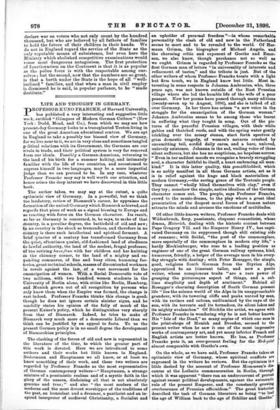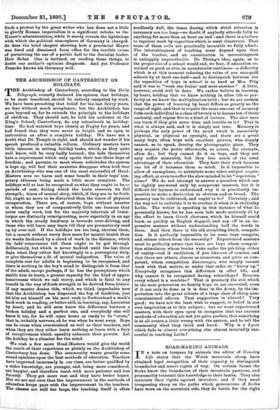LIFE AND THOUGHT IN GERMANY.
The author takes, we may say at the outset, a quite optimistic view of Germany. In a powerful, but we think too laudatory, review of Bismarck's career, he appraises the formation of the united Germany which Bismarck achieved, and regards that piece of work as a signal blessing to Europe and as reacting with force on the German character. Its result, so far as Germany is concerned, is, he says, to make of that dountry, in a peculiar degree, the battlefield of old and new; In no country is the shock so tremendous, and therefore in no country is there such intellectual and spiritual ferment. A brief quarter of a century has transformed Germany from the quiet, oftentimes quaint, old-fashioned land of obedience to lawful authority, the land of the modest, frugal professor, of the retiring haus-frau with her children and her knitting in the chimney corner, to the land of a mighty and ex- panding commerce, of fine and busy cities, humming fac- tories, great technical schools, masses of discontented workmen in revolt against the law, of a vast movement for the emancipation of women. With a Social Democratic vote of two millions, with two hundred women students in the University of Berlin alone, with cities like Berlin, Hamburg, and Munich grown out of all recognition by persons who only knew them when the Empire was formed, the change is vast indeed. Professor Francke thinks this change is good, though he does not ignore certain sinister signs, and he aandidly states his opinion of the folly of much of the present Kaiser's policy, which he distinguishes very sharply from that of Bismarck. Indeed, he tries to make of Bismarck very much more of a democratic Liberal than we think can be justified by an appeal to facts. To us the present German policy is in no small degree the development of Bismarckian principles.
The clashing of the forces of old and new is represented in the literature of the time, to which the greater part of this work is devoted. Here we are introduced to some authors and their works but little known in England. Sudermann and Hauptmann we all know, or at least we know something of their work, and these two writers are regarded by Professor Francke as the most representative of German contemporary writers—" Hauptmann, a strange mixture of a pessimistic realism and of a mystic faith in the glory of the unseen, disdaining all that is not absolutely genuine and true;" and also "the most modern of the moderns and the most devout worshipper of the traditions of the past, an iconoclast and a dreamer, a pantheist and an in- spired interpreter of medimval Christianity, a Socialist and an upholder of personal freedom "—in whose remarkable personality the clash of old and new in the Fatherland seems to meet and to be revealed to the world. Of Her- mann Grimm, the biographer of Michael Angelo, and the charming critic and exponent of Goethe and Emer- son, we also know, though perchance not so well as we ought. Grimm is regarded by Professor Francke as the first German man of letters "in universality of interests and refinement of tastes," and the tribute is just. But of the other writers of whom Professor Francke treats with a light but firm touch, we in England know but little. Moat in. teresting in some respects is Johanna Ambrosius, who, three years ago, was not known outside of the East Prussian village where she led the humble life of the wife of a poor peasant. Now her poems have passed through many editions (twenty-seven up to August, 1896), and she is talked of all over Germany. In her there has arisen "a new voice in the struggle for the emancipation of the German woman." Johanna Ambrosias seems to be among those who learnt in suffering what they taught in song. Out of the pic- tures of the peaceful Prussian villages, with their white gables and thatched roofs, and with the spring water gently trickling over the mossy stones, start forth spectres of grim domestic tragedy, of women's natures crushed by unremitting toil, sordid daily cares, and a bare, unloved, unlovely existence. Johanna is the sad, wailing voice of these silent sufferers, but she has no scepticism, no hopeless sorrow. "Even in her saddest moods we recognise a bravely struggling soul, a character faithful to itself, a heart embracing all man- kind." It is this latter quality, this gemiithlichkeit, which is so nobly manifest in all these German artiste, set as it is in relief against the huge and black materialism of modern Germany,.—the saving grace of the Teutonic people. They cannot "wholly blind themselves with clay," even if they try ; somehow the simple, native idealism of the German character comes out. The people, says Professor Francke, crowd to the music-drama, to the play where a great ideal presentation of the deepest moral forces of human nature attracts the minds and arouses the emotions of multitudes.
Of other little-known writers, Professor Francke deals with Wildenbruch, fiery, passionate, eloquent romanticist, whose drama, Heinrich, dealing with the historic contest between Pepe Gregory VII. and the Emperor Henry IV., has capti- vated Germany on its suppressed though still existing side of romance ; with Seidel, "the poet of the commonplace, more especially of the commonplace in modern city life," a hardy Mecklenburger, who rose to a leading position as engineer of one of the great German railway systems, kind, humorous, friendly, a helper of the average man hi his every- day struggle with destiny ; with Peter Rosegger, the simple, good, religious South German from the Styrian Alps, apprenticed to an itinerant tailor, and now a poetic writer, whose conspicuous traits "are a rare power of grasping the picturesque aspect of things, and a sub- lime simplicity and depth of sentiment." Behind all Rosegger's charming description of South German peasant life "lies the solemn world of the Alps in its unapproachable grandeur, with its towering cliffs and peaks untrod by man, with its ravines and callous, unillumined by the rays of the sun, with its torrents and its tornadoes, its silent lakes and its mighty avalanches." Of Bocklin the artist, we agree with Professor Franoke in wondering why he is not better known. His "Isle of the Dead," so many copies of which one sees in the print-shops of Munich and Dresden, seemed to the present writer when he saw it one of the most impressive
works of contemporary art, and yet many inferior French and English artists are better known. He has, as Professor Francke puts it, an ever-present feeling for the Ercl-geia almost comparable with Goethe's own.
On the whole, as we have said, Professor Francke takes an optimistic view of Germany, whose spiritual conflicts are expressed in the writers he reviews. But the optimism is little dashed by the account of Professor Mommsen's dia course at the Leibnitz commemoration in Berlin, through which it was apparent "there ran an undercurrent of protest against recent political developments, against the autocratic rule of the present Emperor, and the constantly growing overbearance of Prussian officialdom." The great historian described the task of German literature as being "to lead the age of William back to the age of Schiller and Goethe! Such a protest by the great writer who has done not a little to glorify Roman imperialism is a significant rebuke to the Kaiser's administration, while it surely reveals the lightnings with which the political atmosphere of Germany is charged. So does the brief chapter showing how a provincial Mayor was fined and dismissed from office for the terrible crime of permitting the use of a public hall to the Socialist leader, Herr Bebel. One is inclined, on reading these things, to doubt our author's optimist diagnosis. And yet Professor Francke knows his Germany well.



































 Previous page
Previous page